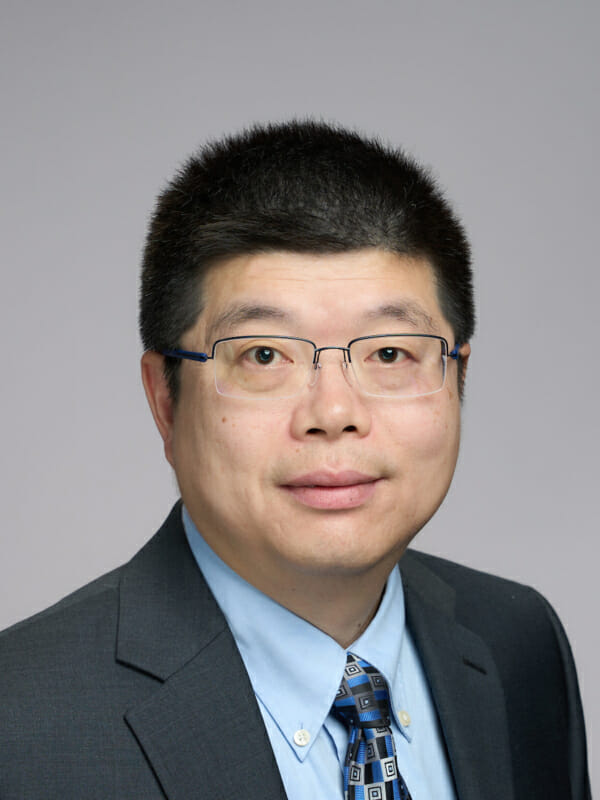
Jianming Xie, PhD
Associate Professor, Biotechnology and Pharmaceutical Sciences
College of Pharmacy
07/2006 – 06/2011
Postdoc (Immunology)
Stanford University
08/2001 – 05/2006
Ph.D. (Chemical Biology)
The Scripps Research Institute
09/1997 – 06/2000
M.S. (Organic Chemistry)
Shanghai Institute of Organic Chemistry, China
09/1992 – 06/1997
B.S. (Chemistry)
Fudan University, China
01/2023 – present
Associate Professor of Biotechnology and Pharmaceutical Sciences, College of Pharmacy, Western University of Health Sciences, Pomona, California
12/2014 – 01/2023
Assistant Professor of Pharmacology and Pharmaceutical Sciences, University of Southern California, Los Angeles, California
07/2011 – 11/2014
Basic Life Science Research Associate, Department of Microbiology & Immunology, Stanford University School of Medicine, Stanford, California
Immunology, Chemical Biology, Pharmaceutical Biotechnology, Immune Cell Engineering, Cancer Immunotherapy, HIV Therapy
- PHRM 5401 Immunology
- PHRM 5225 Pharmacological Basis of Therapeutics V
- PHSC 5203 Biotechnology
My laboratory focuses on engineering immune cells to combat cancer and HIV. Specifically, we aim to develop novel chimeric antigen receptors (CAR) that can enable T cells and natural killer (NK) cells to target cancer and HIV with enhanced specificity and potency. For example, we recently developed an inhibitory CAR (iCAR) that allows T cells and NK cells to “recognize” the absence of HLA-DR molecules on target cells. This approach can improve the specificity of CAR-T/NK cells against cancers with HLA-DR loss or downregulation, a common immune escape mechanism in many blood cancers. We have also developed a universal CAR-T/NK platform, which recognizes DNP (a small molecule) and can be redirected to target various HIV-1 envelope epitopes using DNP-tagged antibodies as adaptor molecules. This modular strategy can help to address the high diversity and mutability of HIV-1, potentially enabling more effective elimination of HIV-infected cells. In another research area, we investigate the application of immune checkpoint inhibitors to further augment the efficacy of CAR-engineered immune cells.
NIH: R15CA293657
Xie (PI)
07/01/2025–06/30/2028
“Engineering natural killer cells to target acute myeloid leukemia with HLA-DR loss”
NIH: R21AI155117
Xie (PI)
07/13/2020–06/30/2024
“A universal CAR-NK cell targeting various epitopes of HIV-1”
WesternU Intramural Grant
Chang (PI), Xie (Co-PI)
07/01/2025–06/30/2027
“NK cells and NK-cell derived markers in urine as non-invasive biomarkers for detection of kidney allograft rejection”
WesternU Intramural Grant
Xie (PI)
07/01/2023–06/30/2025
“Engineering natural killer cells to target acute myeloid leukemia with HLA-DR loss”
- Member, American Society of Gene & Cell Therapy (ASGCT)
- 2025-2028 Member, WesternU Research Committee
- 2024-2027 Member, Communications Committee, American Society of Gene & Cell Therapy (ASGCT)
Complete List of Published Work:http://www.ncbi.nlm.nih.gov/sites/myncbi/jianming.xie.1/bibliography/48801525/public/?sort=date&direction=descending
Rong L, Lim RM, Yin X, Tan L, Yang JH, Xie J. (2022). Site-specific dinitrophenylation of single-chain antibody fragments for redirecting a universal CAR-T cell against cancer antigens. Journal of Molecular Biology 434(8): 167513. https://doi.org/10.1016/j.jmb.2022.167513
Fei F, Rong L, Jiang N, Wayne AS, Xie J. (2022). Targeting HLA-DR loss in hematologic malignancies with an inhibitory chimeric antigen receptor. Molecular Therapy 30(3): 1215-1226. https://doi.org/10.1016/j.ymthe.2021.11.013
Lim RM, Rong L, Zhen A, Xie J. (2020) A universal CAR-NK cell targeting various epitopes of HIV-1 gp160. ACS Chemical Biology 15(8): 2299-2310. https://doi.org/10.1021/acschembio.0c00537
Xie J, Tato CM, Davis MM. (2013). How the immune system talks to itself: The varied role of synapses. Immunological Reviews 251(1): 65-79. https://doi.org/10.1111/imr.12017
Xie J, Huppa JB, Newell EW, Huang J, Ebert PJR, Li Q-J, Davis MM. (2012). Photocrosslinkable pMHC monomers stain T cells specifically and cause ligand-bound TCRs to be ‘preferentially’ transported to the cSMAC. Nature Immunology 13(7): 674-680. https://doi.org/10.1038/ni.2344
Xie J, Wang L, Wu N, Brock A, Spraggon A, Schultz PG. (2004). The site-specific incorporation of p-iodo-L-phenylalanine into proteins for structure determination. Nature Biotechnology 22(10): 1297-1301. https://doi.org/10.1038/nbt1013

